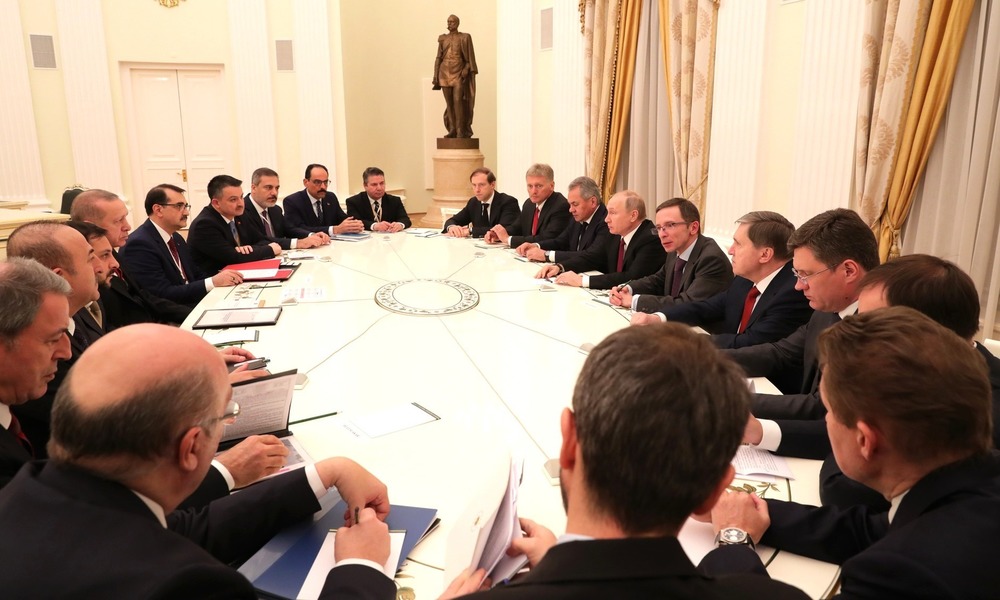RUSSIA MONITOR
Date: 28 January 2019
Erdogan-Putin Meeting: Hope for Tie-in Transaction in Syria
U.S. President Donald Trump’s decision to pull out American troops from Syria may change the strategic situation in the country, with the particular regard to its northeastern regions. This event is likely to be used by Turkey to destroy the Syrian Kurdish YPG militia. And yet such a new position paves the way for new opportunities for Russia as evidenced by the fact that Moscow became a key mediator in talks between Kurds and the Damascus government. The Kremlin would like the YPG-controlled areas to be taken over by al-Assad’s regime. Nonetheless, it seems that Moscow will strive for linking the issue of northeastern Syria with the question of the Idlib province, a region located in the northwestern part of the country. This is the very last bastion of rebel forces, the Syrian occupation of which, backed by Russian and Iranian troops, has hitherto been blocked by Turkey. Both these issues were the main discussion topics during the recent Erdogan-Putin meeting.

On January 23, Russian and Turkish leaders held a bilateral meeting in the Kremlin. When launching talks with his Turkish counterpart, Vladimir Putin said that the two countries are involved in active cooperation on Syria. Earlier, Erdogan had expressed his eagerness to mention the topic of the creation of a security belt on the Turkish-Syrian border, a topic that is also being discussed with Washington. This zone is to prevent the Kurdish militants from further infiltration into Turkey’s territory. Turkish leader was accompanied by Foreign Minister Mevlut Cavusoglu, National Defense Minister Hulusi Akar and National Intelligence Organization head Hakan Fidan.
Such a close partnership between Putin and Erdogan is expressed by the fact that last year both politicians held as many as seven face-to-face meetings, not to mention eighteen officials phone calls. Nonetheless, the U.S. withdrawal from Syria will result in the creation of a vacuum in that strategic part of the country while complicating Russian-Turkish bilateral relations. Therefore it is in Russia’s interest to hand over all areas from where the United States intends to pull out its contingent to the Syrian government forces. Russian Foreign Minister Sergey Lavrov said on January 16 that “the best and only solution is the transfer of these territories under the control of the Syrian government, and of Syrian security forces and administrative structures.” Following his meeting with Putin, Erdogan assured that the two countries share the same standpoint on the security zone in northern Syria. Putin, however, said Russia supports “a dialogue between Damascus and representatives of the Kurds.” In such a manner, Russian President may take advantage of Ankara’s war threats posed to YPG-led forces to persuade the Syrian Kurds to seal a deal with Damascus. This seems to indicate that Moscow and Ankara have not managed to reach a final agreement on this issue. Facing such a situation Turkey keeps pushing its negotiations with the United States, a step which is also considered a tool for exerting pressure on its Russian ally. A day after the Moscow summit Turkey’s Foreign Minister Mevlut Cavusoglu stated that his country “has the capacity to create a “safe zone” in Syria on its own but will not exclude the United States, Russia or others if they want to cooperate.” He also mentioned that negotiations with the United States are currently underway on the strategic city of Manbij in northern Syria. Erdogan pledged a 32-kilometer-wide and 250-kilometer-long “safe zone” in northeastern Syria. Two days ahead of his trip to Moscow, Turkish President held a telephone call with his U.S. counterpart Donald Trump.
In turn, the situation in the Idlib province is used by Russia to exert pressure on Turkey. Last September, Ankara managed to stop a joint Moscow-Damascus offensive against the last major rebel-held bastion. Finally, it was possible to establish a demilitarised zone to be jointly controlled by Russian and Turkish troops. According to Lavrov, “70 percent of this territory is already occupied by terrorists who are trying to attack the Syrian army’s positions, settlements and are trying to threaten our [Russian] military air base in Hmeymim.” On the day of Putin’s meeting with Erdogan, a spokeswoman for Russian Foreign Ministry Maria Zakharova announced that the situation in the Idlib province is rapidly deteriorating. These areas are mostly controlled by Hayat Tahrir Ash-Sham, an Al Qaeda-linked jihadist group. During a summit held in September 2018 in the Black Sea resort of Sochi, the leaders of Russia and Turkey agreed to establish a demilitarized buffer zone in the rebel-held Idlib region. This was to prevent the joint offensive of the Syrian army as well Russian and Iranian forces against the Idlib province. Meanwhile, HTS managed to expand its influence in the province, mostly by smashing moderate and pro-Turkish groups. This may be due to the fact that Ankara keeps deploying loyal Syrian militants from Idlib towards the Kurd-controlled territories.
Russia is thus likely to succeed in at least one of these two areas. If Ankara decides to attack the YPG forces, al-Assad’s forces will treat it as a pretext for attacking the Idlib province while Turkey’s striving for maintaining the status quo in the region will result in Moscow’s urge to incorporate the rebel bastion into the Damascus’s protectorate.
All texts published by the Warsaw Institute Foundation may be disseminated on the condition that their origin is credited. Images may not be used without permission.














